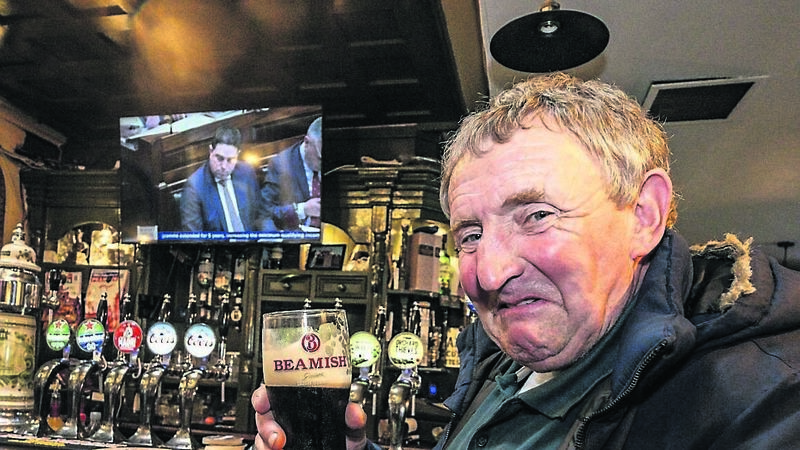Costs rising for Cork publicans but hospitality gets a Vat boost from July

At The Groves Bar in Blackpool, Tim O’Mahony makes the Budget a less bitter pill to swallow with a steady pint in hand. Picture: Chani Anderson
The lunchtime customers in The Groves in Blackpool were unimpressed with Budget 2026 yesterday, as they watched Paschal Donohoe and Jack Chambers on the big screen from behind creamy pints of Beamish.
“You wouldn’t go mad on the extra tenner a week on the pension” was the consensus response to the announced across-the-board €10 increase on social protection payments.
“I’m getting €270 a week, and I was hoping for an extension all right, but more than a tenner, and we won’t see that till March,” said Timmy O’Mahony, 72, from The Glen.
“I don’t mind waiting, if ’twas backdated, but that won’t happen. I worked all my life and surely be to God I should be getting €350 a week.
“It’s a struggle, paying the rent, and the price of fuel, and the price of the pint.”
That there was no increase in excise duty cut little ice in Blackpool, and John Lynch, 66, from Roche’s Buildings, said it was “the worst budget that ever came out”.
“A tenner a week is ridiculous, and an extra fiver on the fuel allowance, they never seem to look after the pensioners,” he said.
One pensioner who gave his name as “Simon Cowell” said the budget had left him “depressed rather than impressed”.

There was a surprising amount of talk about the number of pubs closing down, something which would have been appreciated by Michael O’Donovan, owner of The Castle Inn on South Main St and president of the Vintners Federation of Ireland.
He was equally unimpressed with Budget 2026, not least with the increase in the minimum wage by 65c per hour to €14.15 per hour, telling The Echo that it was “a very disappointing day” for traditional pubs.
“Costs have been increased with minimum wage, and we know auto-enrolment is coming next year, so costs will go up by 6.5% on payroll next year, yet the Government didn’t give any help to the traditional pub,” Mr O’Donovan said.
“Those that do food in our industry will get help in July with the Vat rates being cut from 13.5% to 9%, so for them it’s a welcome day — but for the rest of our sector, it’s a bad day.”
That Vat reduction has come after a long campaign by cafes, restaurants, and others in the hospitality sector. The reduction will kick in from July, despite a call from the industry for it to take force from January.
Liam Edwards, the owner of the Jim Edwards bar and restaurant in Kinsale, said he would have preferred to see the reduction kick in from January rather than July, but he was happy the Government had heard industry concerns.

He said of the 9% Vat rate: “We feel like that’s our survival rate, I think that’s the rate that we can survive. With all the other factors brought in, that is the just rate, that is the rate that should be in Ireland.”
He said the rising cost of doing business has been “unbearable”, and energy costs have not come down, while in the last two to three years wage costs have also gone up 10%-15%.
“What the minimum rate does to a place like us — where we’re very labour-intensive — is that every time the minimum wage goes up, we feel obliged to give everybody a wage increase, and that’s what we have done in the last two to three years."
That increase in minimum wage has also been criticised by Retail Excellence Ireland (REI), the largest representative body for the retail industry in Ireland, which called it “short-sighted and anti-business”.
Jean McCabe, CEO of REI, said that opposition to the measure was not in any way anti-worker.
“Business owners want to look after their people, but the harsh reality is that many minimum-wage workers will not have jobs to go to, as many businesses are not in a position to shoulder these cost increases alone,” she said.
“Any gains for employees as a result of this budget will be short-lived.”
However, the Irish Hotels Federation welcomed Budget 2026’s Vat measures, with its president, Michael Magner, owner of the Vienna Woods Hotel, describing them as “a crucial intervention for struggling food service businesses the length and breadth of the country at a time of enormous challenges and unsustainable increases in operating costs”.







 App?
App?


